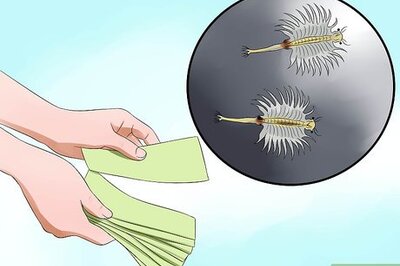
views

As the 74th edition of the world's oldest movie festival at Venice is all set to open later this evening (August 30) with the Hollywood work, Alexander Payne's Downsizing (starring Matt Damon and Christoph Waltz), it may seem incredible how this 11-day cinematic event on the picturesque island of Lido, overlooking the historic San Marco Square on the mainland, has managed to pull itself out the quagmire of distressing political developments.
Set in motion in 1932 primarily to quench the Italian Fascist leader, Benito Mussolini's thirst for propagating his ideology and that of his friend and compatriot in crime, Germany's Adolf Hitler, the Venice Film Festival also helped lift sagging sales at the end of the summer tourist season. If the hotels were happy with the rush of Festival visitors to Venice when most of them would have gone back to work, politicians could not have asked for something better than a bunch of overly PR movies – many of them shamelessly pushing Fascist points of view at a time when the world was perched at the doorway of another catastrophic war.
However, the French were clearly not enamoured of this Fascist celebration. In fact, during one such Venice edition, they walked off in a huff when they saw that even the prizes had been manipulated, with most of them going to German and Italian films.
But the French could set in motion their own festival at Cannes only in 1946 – World War II having intervened – but soon managed to give Venice a run for its money. In fact, given the uneven political scenario in Italy for years – something that has still not disappeared – the Festival on the Lido has had trying times, political interference being an important cause. There was a time when it almost seemed that the Festival would sink into the Adriatic Sea, on the shores of which Lido stands. Till a veteran festival helmer, Marco Mueller, took charge in early 2000 and went on to become Venice's longest serving head – eight years till 2013, when the present Director, Alberto Barbera, stepped in.
Marco's leadership saw Venice bobbing out of the Adriatic waters again, and there were many years when just about every movie out of the dozens that played there were either world or international premieres.
One of the reported reasons for Mueller's removal was Venice 's overwhelming desire to compete with the Cannes market, but somehow Barbera has not been able to get that going either. Admittedly not an easy task; Cannes market is huge and immensely, immensely popular – a concept that even Goa's Film Bazar (organised by the National Film Development Corporation of India) has been trying to replicate.
But Venice has certainly swam past Cannes in as far as the Oscars go. Over the past four years, none of the festival majors has been as consistent as Venice in picking Oscar winners. Seventy-two Academy Award nominations and 23 actual wins is Venice's tally since Barbera took over in 2013 with either a Best Picture or Best Director Oscar from each of the past four years – for Gravity, Birdman, Spotlight and La La Land.
This time with new titles from George Clooney (Suburbicon), Darren Aronofsky (Mother), Payne (Downsizing) and Paul Schrader (First Reformed), Venice's list is mighty impressive. -- and looks like a great Oscar push.
Downsizing is also a science fiction like Gravity – which heralded the Festival a few years ago and which spoke about two astronauts (George Clooney and Sandra Bullock) getting lost in the dark, dark space.
Here is what the Festival says about Downsizing in its brochure: “Downsizing imagines what might happen if, as a solution to over-population, Norwegian scientists discover how to shrink humans to five inches tall and propose a 200-year global transition from big to small. People soon realise how much further money goes in a miniaturised world, and with the promise of a better life, everyman Paul Safranek and wife Audrey decide to abandon their stressed lives in Omaha in order to get small and move to a new downsized community—a choice that triggers life-changing adventures”
Sounds fascinating and with Payne's drama having on its cast such fabulous actors as Damon, Waltz, Hong Chau and Kristen Wiig, the movie is bound to grip us.
In fact, Damon has scored a double whammy this year by also appearing in Clooney's Suburbicon – which is written by brothers Ethan and Joel Coen, who gave us gems like Fargo, No Country for Old Men and Inside llewn Davis. Suburbicon is a period piece set in the 1950s and speaks about a peaceful suburban community which is shattered by a home invasion.
Aronofsky's (who chaired the Venice Competition jury in 2011) Mother has Jennifer Lawrence in a psychological thriller. The work created a scandal of sorts when it released a terrifying poster – on Mother's Day – of Lawrence holding her “bloodied heart”.
Also to be taken note of will be Guillermo del Toro – whose movie on the Cold War, The Shape of Water (with Sally Hawkins), will compete with 20 others for the prestigious Golden Lion.
Britain's Lean on Pete (adapted from Willy Vlautin's novel) will also vie for the Golden Lion – narrating a story about a young boy and his affection for an incapacitated race horse. Some of the others in this top category will be the Japanese helmer, Hirokazu Koreeda, with his crime adventure, The Third Murder, French auteur Abdellatif Kechiche's (who gave us Blue is the Warmest Colour) Mektoub My Love, Three Billboards Outside Ebbing, Missouri (Frances McDormand and directed by Martin McDonagh), and Paulo Virzi’s comedy, The Leisure Seeker, starring Helen Mirren and Donald Sutherland.
Outside the Competition, the Festival will offer films like The Lunchbox, Ritesh Batra's Our Souls at Night (with Robert Redford and Jane Fonda), Stephen Frears’ Victoria and Abdul (which will have Judi Dench reprising her role as Queen Victoria two decades after starring as the monarch in Mrs Brown along with Ali Fazal) and Loving Pablo, a biopic of Pablo Escobar starring Javier Bardem as a drug kingpin.
The Festival will close on September 9 with Takeshi Kitano's Outrage Coda, a Yakuza thriller from Japan.
(Gautaman Bhaskaran is an author, commentator and film critic who has covered Venice for 18 years)


















Comments
0 comment